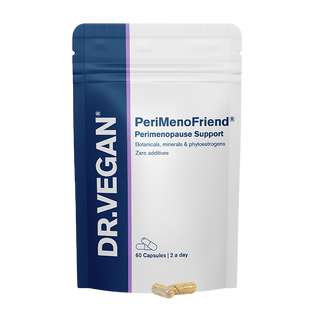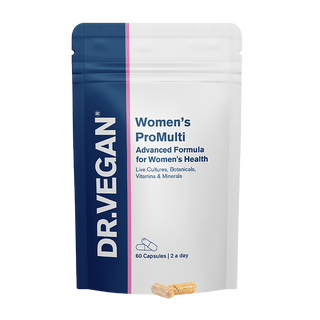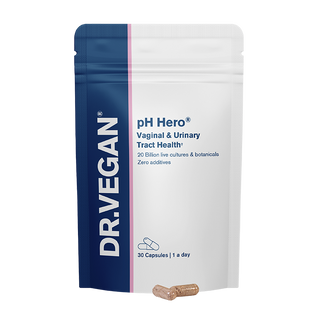The role of nutrition in vaginal and bladder health

Food isn't just for fuel; it's a key pillar for many parts of your health, including vaginal health. What women eat can play a role in improving or worsening the vaginal microbiome. Women’s intimate health specialist, Jessica Childs delves into the role of nutrition in vaginal and bladder health.
Intimate health issues are common, unfortunately
If you have ever suffered from thrush, BV or a Urinary Tract Infection (UTI), you are not alone:
- About half of all women will experience a UTI in their lifetime.
- Approximately 1 in 5 women will experience recurrent UTIs.
- 1 in 10 post-menopausal women have had a UTI in the last year.
- Up to 75% of women will experience thrush in their lifetime.
- Bacterial vaginosis (BV) is the most common vaginal condition in ages 15-44.
DR.VEGAN® surveyed 1,202 women to explore the prevalent vaginal issues women face, causes of vaginal health issues, treatments that work, and the broader impact on their lives and relationships. The consumer survey found:
- 95% of women believe that vaginal health is insufficiently addressed in educational settings.*
- 15% of the women reported infections or thrush around their menstrual cycle.*
- Postmenopausal women were found in the survey to be five times more likely to experience vaginal atrophy compared to perimenopausal women, and also suffered more frequently from UTIs.*
- More than one-third of the customers reported pain during sex due to infections, dryness, or irritation.*
- Only 29% of women take a vaginal probiotic to support their vaginal health.*
These statistics and others were why DR.VEGAN® created pH Hero®, the award-winning probiotic supplement to combat UTIs, infections and dryness, and for complete vaginal health. Continue reading the latest vaginal health survey by DR.VEGAN®.
PeriMenoFriend®

What influences intimate health?
Many factors can impact the health of the vagina, vulva and bladder, including hormone fluctuations, food choices, lifestyle habits, use of antibiotics, immune status, the impact of stress and microbiome resilience.
Women commonly experience symptoms as their hormones change, predominantly during and after childbirth or through perimenopause and post-menopause. This is because oestrogen plays a predominantly protective role in vaginal and bladder health, and reduced levels can cause tissues changes and put us at a higher risk of bacterial imbalances and infections.
Lifestyle habits such as douching, washing the vulva with soap, or exposure to chemicals via swimming pools or sanitary towels can be disruptive to the vagina’s acidic pH balance, which is integral to its health. Simply stopping all these habits can support intimate health for the better.
Antibiotics can temporarily reduce healthy bacteria in the body, which can increase the risk of pathogenic microbes thriving, particularly yeast, which causes thrush.
The immune system is our first line of defence; if this isn’t optimal, our infection risk is higher. The gut is important too; over 70% of our immune cells reside here, and there is a link between the gut microbiome and other microbial sites of the body, so nurturing our gut is always favourable for good intimate health. Continue reading about how your gut and vagina are linked. You may also be interested in reading more about the connection between your gut and your hormones.
Women's ProMulti

What role does nutrition play in vaginal and bladder health?
What we eat and absorb can impact all aspects of our body, for better or worse, including the bladder and vaginal areas. Here are some nutrition tips for good intimate health:
- Eat the rainbow: different coloured fruits and vegetables help to encourage the growth of good bacteria, outnumbering infection-causing bacteria. Enjoy red: pomegranate, red peppers and raspberries. Green: asparagus, broccoli and kiwis. White: onion, garlic and cauliflower, etc.
- Regularly consume probiotic foods: these nourish the microbiome sites of the body with good bacteria. Enjoy live yoghurt, kefir, sauerkraut, kimchi, miso and tempeh.
- Avoid refined sugar: fluctuating blood sugar can encourage pathogens and yeast to thrive. Eat three balanced meals a day, including protein and complex carbs, to avoid cravings for sugary snacks. Choose treats sensibly, for example, yoghurt with honey, dark chocolate, dates and peanut butter. Continue reading about the link between sugar and yeast infections.
- Eat good-quality protein at every meal: protein helps to make tissues, hormones, and immune cells. Discover the best protein sources on a plant-based diet, and include a variety of beans, lentils, nuts and seeds.
If you are struggling to get these foods via diet alone, supplements are a good alternative and can provide specific and therapeutic support.
Can nutrition impact menopausal symptoms such as vaginal dryness and increased urination?
Yes, nutrition is a good place to start. Good fats are useful for keeping the tissues plump and moist. Ensure a good supply of omega 3, which can be found in walnuts, chia seeds and flaxseeds. DR.VEGAN's Vegan Omega 3 includes 1,000mg Omega oil, providing a dosage of 300mg DHA and 150mg EPA per serving.
Including phyto-oestrogenic foods in your diet can also help; these foods contain substances that weakly mimic oestrogen in the body, and the lack of oestrogen that can cause changes in the bladder, which may result in an increased urge to urinate. Phytoestrogen foods include flaxseeds, sesame seeds, unprocessed soya products such as tofu, tempeh and edamame beans, lentils, mung beans and alfalfa sprouts.
pH Hero® by DR.VEGAN® includes Sea Buckthorn alongside Cranberry, Nettle and Vitamin B6, as well as a proprietary blend of probiotic strains selected to support a healthy vaginal flora.
You may be interested in reading 'Vaginal dryness: causes, symptoms & remedies' or 'What is vaginal atrophy?'.
How can I investigate my symptoms further?
If you are living with intimate health issues, you deserve answers. Chronic symptoms can impact our quality of life and relationships, and in the case of fertility, vaginal imbalances may even impact pregnancy outcomes.
Unfortunately, standard NHS tests do not always detect infections or the culprit of infections, so treatment isn’t always effective. Thrush and BV can occasionally be misdiagnosed too.
UTIs are an awful condition, especially when they become chronic or recurrent. To anyone suffering, consider where the pathogens are coming from - the vagina and gut are common culprits - and why the body is unable to fight off these infections - is the immune system working, are hormones balanced, is diet helping or hindering, and how is the gut?
Research and testing in the area of vaginal and bladder health have been progressing in recent years. We understand more about specific microbial species and what their presence may mean. Jessica Childs helps clients interpret these results to better understand their microbial imbalances and develop a targeted plan to support their return to health.
If you are interested, here is a list of private testing companies that offer these services:
- Screenme vaginal testing
- Digital microbiology vaginal and urine testing
- Microgen vaginal and urine testing
About Jessica Childs
Jessica Childs is a Nutritional Therapist based in the UK; she has specialist training in women’s intimate health. Jessica works with clients suffering from chronic vaginal and bladder problems; she looks at their whole health and what may be driving ongoing symptoms, and she recommends diet, lifestyle and supplement changes to support women back to better health.
For more information visit www.jessicachilds.co.uk or follow her on instagram: @jessica_womenshealth.
*This article contains data from UK surveys conducted by DR.VEGAN®. All survey findings reflect our own research efforts and have not been influenced or verified by any external organisations or third-party entities.
You may also enjoy reading:
- Period blood explained
- What is period poo?
- Understanding perimenopause periods
- The surprising life impacts of PMS
- What PMS type are you?
- Nutrition for PMS symptoms
References
- Epidemiology of urinary tract infections: incidence, morbidity, and economic costs
- Urinary Tract Infection
- Debunking urinary tract infection myths
- Vaginal yeast infection (thrush)
- Bacterial vaginosis
Want to hear more from our nutritionists? Sign up to our email newsletter for insights and exclusive offers:


















